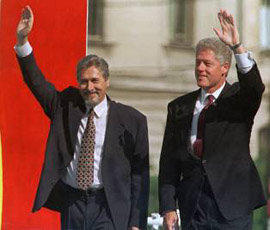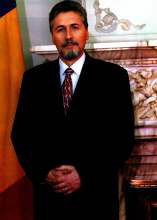
|
| |

|  Romania Romania
the awakening giant of Europe |

Looking for lost prosperity - 1997 : A mixed performance - Rebuilding the Country -
Major Infrastructure Projects March On - The Tough Game - No Pain, No Gain -
The Young Wolves of the Private Sector - What's Next? 
 Romania : The Awakening Giant of Eastern Europe Romania : The Awakening Giant of Eastern Europe
 Looking for the Lost Prosperity Looking for the Lost Prosperity

At the time when the capital of the country, Bucharest, was nicknamed "the Little Paris," during the first decades of the XX-th century, Romania was an island of prosperity and stability in Southeastern Europe. Greeks, Turkish, Bulgarians Serbs and Jews were coming in the country to seek their fortunes, taking advantage of both the traditional hospitality and tolerance of the Romanians, and equally by the tremendous business opportunities the country offered at the time. It was the time when the Romanian economy was basically equal to Belgium's and larger than the Spanish economy. The time when the Romanian currency, the Leu, was stronger than the German Mark. Not even the Great Depression had shaken too much country's flourishing economy.
All these came to a brutal end when, after the Second World War, the Soviet-backed communist regime took over the country. By the end of the ninth decade Romania was almost ruined and was clearly heading to an economic and social disaster. Yet the worst impact the communist regime had was likely on people's minds, on their beliefs and mentalities. They almost killed the spirit of free initiative, the accountability for their lives and the hope for better of most Romanians, replacing them by the concept of a tough, despotic state, that takes care (even if not in an effective way) of everything. No other single country in the region - except perhaps Albania - has experienced such a traumatizing communist dictatorship, similar in many respects, especially in the '80s, to the North Korean regime.
| 
A geology and law graduate, with a prestigious academic career behind, Emil Constantinescu won the 1996 presidential race as a representative of the civil society, rather than as a party leader. And now, more than anybody else, the charismatic Romanian President feels the huge burden of his people's enormous expectations and of the confidence they have invested in him: "What Romanians hoped and wanted in 1996 was to see solved, as soon as possible, all the contradictions that have accumulated during the past 50 or 60 years. Certainly, this was not possible, but Romanians were wise enough to understand this." It is that wisdom that explains why the country had no major social unrest, although 1997 was a difficult year, with plummeting living standards.
Taking in consideration the future integration of Romania in the European Community, another Mr Constantinescu, the Ambassador of Romania to Belgium plays an important role in the relations between Romania and the European Community.
|
© World INvestment NEws, 1998.
This is the electronic edition of the special country report on Romania
published in FORBES
Magazine's enriched with complementary information,
such as full interviews, detailed company files and more.
June 1 st 1998 issue
Developed by AgenciaE.Tv |
|
|
|
| |
| | | |
|

